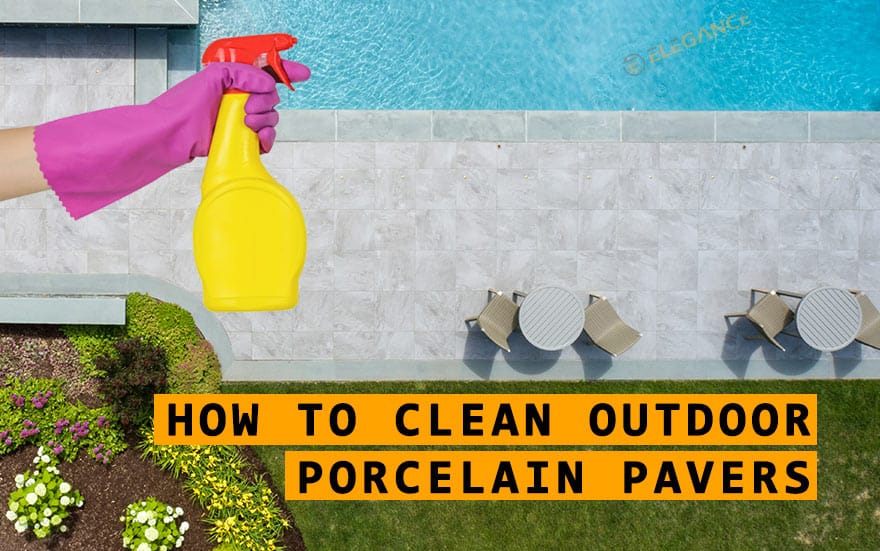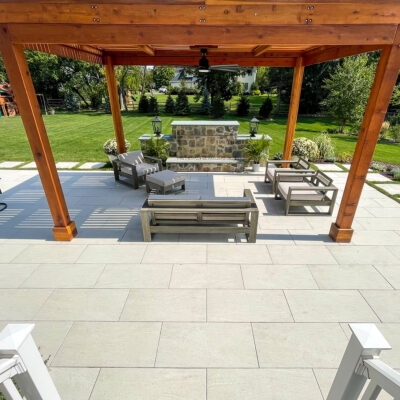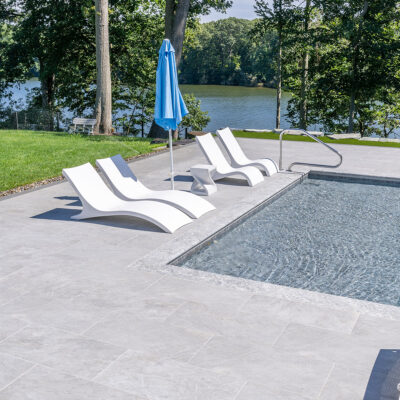DOWNLOAD A PORCELAIN PAVER CLEANING GUIDE AT THE END OF THIS BLOG
Maintaining the pristine look of porcelain pavers is vital for preserving their durability and aesthetic appeal. As experts in outdoor flooring solutions, we understand that routine cleaning is essential to keep these surfaces looking their best. Porcelain pavers are known for being low maintenance, but they do require certain cleaning techniques to effectively remove dirt and prevent damage.
When our porcelain pavers become slightly dirty, a simple cleaning solution can be effective. We suggest using a specialized tile cleaner for porcelain pavers that’s designed to tackle easy stains and maintain the luster of the tiles. In cases of more stubborn dirt or grime, a stronger solution may be necessary. This is when we recommend a potent cement remover outdoor porcelain cleaner, specifically formulated to address tougher stains that a regular cleaner can’t handle.
Key Takeaways
- Porcelain pavers need routine cleaning to maintain their appearance.
- A tile cleaner is suitable for easy stains on porcelain pavers.
- Cement remover cleaner is recommended for tougher stains.
What Are Porcelain Pavers?
You know what porcelain is, but do you really know what it is?
Porcelain tile is part of the ceramic family, which is why you probably think of bone china and other delicate dishware or delicate figurines when you hear the name. However, a significant factor in what makes porcelain so unique is the process by which it’s manufactured.
Porcelain tile is manufactured according to higher standards than other common ceramic products. It’s made of purified and highly refined clay that undergoes a longer firing process at much higher temperatures than any other ceramic product. This unique manufacturing process results in a highly durable and customizable material that can be used to build everything from walls to floors, both indoors and out.
Porcelain pavers are explicitly made from the highest grade of porcelain, making them a worthy counterpart to natural stone and concrete products. Their exemplary combination of quality engineering and aesthetic appeal allows them to achieve superior density and unmatched performance while remaining uniform throughout each slab. Porcelain pavers are made with a variety of recycled materials and kiln-fired clay. They have been used for decades in some of the most challenging and climatically extreme environments around the globe.
Real-Life Examples and Case Studies
Example 1: Chemical Etching on Porcelain Pavers
In one project, a homeowner found some of their porcelain pavers etched by acid. This type of damage cannot be fixed with chemical products.
Instead, it requires a mechanical solution. Honing Cream is recommended. It micro-polishes the tile’s surface, restoring its appearance. Watch this video to see how to apply the product.
Example 2: Cleaning Cement Residue
During another project, cement was accidentally spilled on porcelain tiles. The best solution for this issue is Cement Remover. It effectively cleans off the cement without damaging the tiles.
Example 3: Dealing with Pollen on Porcelain Pavers and Marble
A customer with both marble copings and porcelain pavers noticed pollen accumulation. For the porcelain pavers, a simple wash with water or a neutral cleaner suffices. However, the marble requires a bit more care due to its porous nature. Using Deep Degreaser is recommended for both surfaces. For stubborn residues, Colored Stain Remover can also be effective.
Myths Surrounding Porcelain Pavers
Despite its durability and versatility, it took porcelain pavers a while to become a popular product for building outdoors. A significant reason for this is the widespread myth that porcelain is delicate and fragile, which came about due to the material’s primary use for making dolls and dishware for thousands of years. Porcelain is also thought to be extremely expensive and limited in its applications – both of which are myths. You can read more about Outdoor Porcelain Paver Myths Debunked
in our blog.
Due to the various myths surrounding porcelain, it took advocates of porcelain pavers a while to debunk them and start spreading the word about the material’s exceptional potential. While the pavers caught on throughout the West Coast, it wasn’t as easy to convince the folks in New England to give them a chance. It took some education and a broadened variety of styles to win the hearts of homeowners, builders, and architects to turn their eyes away from natural stone like bluestone and fieldstone – the hallmarks of New England’s unique landscape style – and give porcelain a try. But once they finally did, the pavers began soaring in popularity.
Benefits of Using Porcelain Pavers
While porcelain immediately brings up images of dolls and dishware for most people, it has also been a popular option for a wide range of indoor surfaces for decades. Around the world, people have been using porcelain to outfit and decorate bathrooms, kitchens, entryways, mudrooms, and other similar areas of the home. As porcelain can easily be adapted to suit various design styles, it eventually found its way into various outdoor applications, most frequently for patios and pools.
One of the porcelain’s most captivating features is its ability to be made into pretty much any custom pattern a person could desire. Porcelain’s unique ability to suit both sophisticated and casual environments coupled with its adaptability coming in any color, shape, and size makes it the perfect material for a modern farmhouse style as well as an array of contemporary design styles.
As far as outdoor use goes, porcelain pavers are one of the most underrated options out there, though they are starting to gain the recognition they deserve. They can be used to build everything from terraces and balconies to roof decks, walkways, and pool deck areas.
In addition to their outstanding functionality, they’re non-slip, stronger than natural stone, and easy to clean. They also resist mold, mildew, and moss, and they’re not susceptible to freezing. Here are all the benefits of choosing porcelain tiles and pavers for outdoor applications:
- Porcelain tiles and pavers have a water absorption rate of less than 0.5 percent, which makes them naturally stain- and weather-resistant
- Because they absorb almost no water, porcelain tiles and pavers won’t crack in freezing temperatures like many other materials
- Even when exposed to direct sunlight, porcelain tiles and pavers are highly resistant to UV fading
- The manufacturing process that porcelain pavers go through makes them stronger and more durable than any other ceramic material used in high-traffic areas
- They’re naturally non-porous and sealed
- They’re resistant to harsh weather conditions and don’t crack like natural stone
- Porcelain pavers can be treated with ice melt without getting damaged or ruined
- They’re non-staining, which makes them an excellent choice for high-traffic areas that will be exposed to pets, children, parties, or natural debris
- They’re non-slip, which is another feature that makes them ideal for entertainment spaces that get a lot of use, especially from children, such as pool decks and patios
- Porcelain pavers are easy to clean – brushing with warm soapy water is often all that’s required to keep them looking new.
- They stay cool in the summer
- They’re made with high-definition finishes that won’t fade – even when exposed to direct sunlight for extended periods
Many designers and homeowners are drawn to natural stone options, such as bluestone and flagstone, for outdoor projects like pool decks and patios. These stones are usually chosen for their colors, beauty, and classic appeal. However, advocates of porcelain pavers and tiles are convinced that the main reason someone wouldn’t choose porcelain instead is simply that they’re unaware of its adaptability and features. Porcelain tiles and pavers can be made to take on the look of any natural stone and are more durable and versatile than any of them as well.
While porcelain pavers have a high price point compared with some other outdoor options, the quality is well worth it. You can also count on it being in regular supply, unlike natural stone, whose availability depends on the current events of the natural environments it’s sourced from. Porcelain pavers are made in independent United States factories dedicated to manufacturing them, so you can always be sure that there’s a steady supply to meet the growing demand.
The goal of any designer is to achieve harmony in form and function. For most people, that means taking into account a busy, sometimes messy lifestyle while choosing a material that looks good and works for them. Porcelain pavers are one option that generally ticks every box on anyone’s features list.
Porcelain Paver Types and Styles
As mentioned above, one of the most favorable features of porcelain pavers is that they can be made to perfectly mimic the look of any natural stone out there. They come in a wide range of colors, textures, sizes, and finishes to suit any design style or project type. Below are the basic and most common types and styles of porcelain pavers. In most instances, they are customized to take on the most unique features that a person could dream up.
Bluestone Look
Bluestone is one of the most common options for walkways, patios, pool decks, entrance paths, and even driveways and exterior walls. It’s a naturally textured stone that’s available in smooth, tumbled, or cobblestone finishes. Porcelain pavers made to look like bluestone generally come in square or multi-size cube patterns.
Travertine Look Porcelain Pavers
Travertine is a more elegant-looking option that’s similar to marble. It’s a common choice for outdoor floors and walls, courtyards, patios, pool decks, walkways, paths, and stairs. Porcelain pavers made to look like travertine comes in crosscut patterns and is available in natural colors ranging from silver and cream to tan.
Marble Look Porcelain Pavers
Porcelain pavers can be made to mimic the look of just about any natural stone in a variety of colors, making it one of the only truly customizable materials available for outdoor use.
Wood Look Porcelain Pavers
Porcelain pavers can even be made to look like wood and can be customized in light and dark shades, making it perfect for landscaping in a wooded area where you want some extra durability, long life, and low maintenance.
Characteristics of Porcelain Pavers
Porcelain pavers are known for their hardness, density, and low porosity, which make them extremely resilient to various environmental factors. They are:
- Resistant to: Stains, scratches, and harsh weather conditions.
- Maintenance: Low maintenance and easy to clean with suitable products.
We offer a tile cleaner that effectively addresses light soiling, ensuring your porcelain pavers maintain their pristine appearance.
Benefits of Porcelain Pavers
Porcelain pavers come with a multitude of benefits that make them an attractive option for outdoor spaces. They boast:
- Longevity: They are incredibly durable and can last for years with proper maintenance.
- Aesthetics: Available in various colors and textures that mimic natural stone or wood.
Furthermore, for more challenging stains, our robust outdoor porcelain cleaner is designed to tackle tougher substances without damaging the pavers’ surface.
Cleaning Fundamentals
Maintaining the pristine condition of porcelain pavers is simple with consistent care and the right cleaning approaches. From routine maintenance to addressing spills quickly and performing seasonal deep cleans, adhering to these methods ensures your porcelain surfaces remain immaculate and enduring.
Regular Maintenance
Porcelain pavers thrive with regular upkeep. Sweeping or using a dust mop daily prevents the accumulation of debris that can scratch or dull the surface. We also advise using a gentle detergent solution for a more comprehensive clean when necessary. This regular maintenance establishes a base level of cleanliness and helps avoid grime build-up.
Dealing With Spills
Swiftly addressing spills is vital to maintaining the integrity of porcelain pavers. Blot liquids and remove solids immediately to prevent staining. For most spills, soapy water is sufficient, but for tougher substances like cement or paint, a specialized cleaner for tougher stains may be necessary.
Seasonal Cleaning
At the beginning of each season, a deeper clean may be needed to restore porcelain pavers to their original lustre. Utilize a slightly acidic tile cleaner designed for porcelain to effectively remove stubborn residues without damaging the tile. This seasonal deep clean complements regular care and addresses any discoloration or stains that may have developed.
Stain Removal Techniques
When it comes to maintaining the beauty of porcelain pavers, effective stain removal is essential. Each type of stain requires a specific approach to ensure thorough cleaning without damaging the surface.
Organic Stains
Organic stains from leaves, berries, and bird droppings can be persistent. We recommend using a tile cleaner for porcelain that’s designed to handle such substances. Apply the cleaner directly to the stain, allow it to sit momentarily, and then gently scrub with a soft-bristle brush before rinsing with water.
Oil-Based Stains
Stains from oil or grease require a more rigorous cleaning solution. For these types of stains, an alkaline degreaser is most effective. Apply the degreaser to the stained area, allow it to penetrate for a few minutes, and scrub with a nylon brush. Rinse thoroughly with clean water to prevent any slippery residues.
Rust Stains
Rust can leave particularly unsightly stains that are tricky to remove. Use a cleaner with oxalic acid or a cement remover if the rust is severe or has been left for a prolonged period. Apply the solution to the affected area, scrub with a brush to loosen the stain, and rinse carefully with water.
Efflorescence
Efflorescence is a white powdery residue resulting from the migration of salts to the surface of porous materials. To combat efflorescence, wash the pavers with clean water and a neutral detergent. If this doesn’t work, an acid-based cleaning agent can be applied sparingly, followed by a neutralizing rinse with water.
Advanced Cleaning Procedures
In tackling difficult stains or extensive dirt accumulation on porcelain pavers, specific equipment and targeted methods are often required. We’ll explore both mechanical solutions and more intensive hand cleaning techniques that can restore your pavers to their original condition.
Machine Cleaning
For extensive or large-scale cleaning needs, machine cleaning can be both time-efficient and highly effective. We often turn to pressure washers for their ability to clear grime and airborne pollutants with precision. It’s crucial to use:
- A low to medium water pressure setting
- A flat-surface cleaner attachment if available for even cleaning
Please note: While machine cleaning is effective, it’s important to always follow the porcelain manufacturer’s guidelines to avoid damage.
Restorative Techniques
Sometimes, pavers require a more thorough cleaning process, especially when dealing with tough stains like cement or grout haze. For such situations, we have specialized cleaners available:
- For basic stains: Our tile cleaner for porcelain is formulated to handle everyday dirt effectively.
- For persistent stains: We recommend our cement remover outdoor porcelain cleaner, designed to tackle the most stubborn residues.
When using these products, we advise following the specific dilution and application instructions meticulously to achieve the best results without causing harm to the porcelain pavers.
Preventative Maintenance
Preventative maintenance is key in preserving the appearance and integrity of porcelain pavers. Regular cleaning with appropriate solutions is vital. We provide a gentle tile cleaner that’s suited for easy-to-remove stains. However, should you encounter more persistent or difficult stains, we suggest our cement remover outdoor porcelain cleaner, which is tailored for tougher challenges. Remember, avoiding abrasive tools and harsh chemicals is paramount in maintaining the pristine condition of your pavers.
Additional Considerations
When cleaning porcelain pavers, there are a few important things we want you to keep in mind for your safety, the environment, and to ensure that you’re not voiding any product warranties.
Safety Precautions
Avoid Harsh Chemicals: It’s imperative to steer clear of cleaners that are high in acid or contain aggressive chemicals that could harm both the pavers and yourself. We always recommend wearing protective gloves and goggles when dealing with cleaning detergents to prevent skin and eye irritation.
Proper Ventilation: Ensure that you’re working in a well-ventilated area to prevent inhaling fumes from any cleaners, even those that are eco-friendly.
Eco-Friendly Products
Gentle on the Environment: Use eco-friendly cleaners that are less harmful to the surrounding flora and fauna. Our tile cleaner for porcelain is designed to tackle easy stains without the harsh impact on the ecosystem.
Effective for Tough Stains: For more persistent issues, an outdoor porcelain cleaner can be used. It’s tough on stains but still mindful of the environment.
Warranty Preservation
Check Product Compatibility: To keep your warranty intact, confirm that any cleaning product you use is suitable for porcelain pavers. Always read the manufacturer’s guidelines before applying a product.
Document Product Usage: In the rare case that an issue arises and you need to claim your warranty, having a record of the products and methods used can be helpful. Keep a log of maintenance for due diligence.
Frequently Asked Questions
In addressing frequently asked questions, we provide clear and specific guidance to ensure the longevity and beauty of your porcelain pavers. We tackle common concerns from removing tough stains to the proper use of cleaning tools.
What is the most effective method for removing mud stains from porcelain patio tiles?
The most effective method for lifting mud stains off porcelain patio tiles is to first allow the mud to dry and then sweep it away with a soft-bristle brush. For any remaining stains, gentle washing with a tile cleaner can effectively remove mud residues.
How should porcelain patio tiles be cleaned post-grouting?
After grouting, it’s essential to clean porcelain patio tiles with an acid-based cleaner like “Deterdek”, which is designed to remove grout residue. Always follow the manufacturer’s instructions to avoid damaging the tile’s surface.
What are the advantages and disadvantages of using porcelain pavers?
Porcelain pavers provide a non-porous, slip-resistant surface that is resistant to stains, frost, and fading. However, they can be more expensive than other materials and require careful handling during installation due to their brittleness.
Which cleaning implements are recommended for maintaining outdoor porcelain tiles?
To maintain outdoor porcelain tiles, use a soft-bristle brush or broom for regular dry removal of debris. For wet cleaning, a mop equipped with a microfiber or non-abrasive pad is recommended to preserve the integrity of the paver surface.
Is it safe to use a pressure washer on porcelain paving?
Using a pressure washer on porcelain paving can be safe, provided it is done correctly. Maintain a safe distance of 12 to 18 inches and use a low-pressure nozzle to prevent surface damage. It’s an effective way to rinse off the cleaning solutions after application.
What techniques are best for tackling stubborn stains on outdoor porcelain tiles?
For tackling stubborn stains on outdoor porcelain tiles, it is advised to use a specialty outdoor porcelain cleaner, such as a cement remover that targets heavy soiling. Apply the product as directed, using a non-metallic brush to gently scrub the affected areas.
Whether you’ve recently installed porcelain pavers outdoors and are looking for cleaning solutions and advice, or are considering installing porcelain pavers and are looking for someone to help, we’ve got answers for you. Contact us to discuss your situation and see how we can help you with any of your porcelain pavers cleaning-related queries.
DOWNLOAD FREE PORCELAIN PAVER CLEANER GUIDE HERE: https://ntpavers.com/wp-content/uploads/2024/05/CLEANING-GUIDE-NT-PAVERS.pdf

















